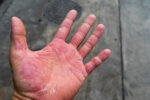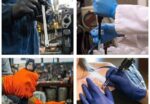The primary classification of gloves includes food service gloves (industrial-grade gloves) and medical gloves. Naturally, there’s a lot of curiosity that revolves around the difference between these two types of gloves and the fact whether or not the two can be used interchangeably.
The biggest difference between medical gloves and food service gloves is FDA approval. The FDA is very stringent when it comes to medical gloves. All gloves, in general, are put through a series of tests as laid by the FDA.
Only those gloves that meet all the safety guidelines are FDA-approved. And FDA-approved gloves are used as medical (examination) gloves. On the other hand, since the risk to life and health is lesser in the food industry, FDA-accepted gloves can be used as food service gloves.

To put it simply, FDA-approved gloves are medical gloves and FDA-accepted gloves are industrial gloves (food service gloves).
This difference naturally gives rise to many questions: are food service gloves safe, what’s the difference between FDA-approved and FDA-accepted, whether or not the two (food service gloves and medical gloves) can be used interchangeably, and more.
If these questions have been lingering in your head too and you want to learn everything about the difference between food service gloves and medical gloves, then this guide will be a delightful read.
Food Service Gloves and Medical Gloves: What’s the Difference?
The FDA regulates and controls the quality of gloves in a way that they’re safe for human health. The risks involved in hospitals and the foodservice industry are almost similar (not entirely).
When it comes to medical gloves, the gloves have to clear all tests laid by the FDA. When it comes to foodservice gloves, the gloves have to meet a certain standard. It means that even if a few tests aren’t cleared, the gloves are still safe to be used.
In order to better understand the difference between medical gloves and food service gloves, let’s first understand what are the FDA parameters that all gloves are tested for.
Here’s the list of what the FDA suggests for testing:
-
-
- Puncture resistance.
- Chemical resistance.
- Abrasion resistance.
- Leak resistance.
- Tear resistance.
- Resistance against bacteria, fungus, Viruses, and blood-borne pathogens.
- Material regulation (latex, nitrile, or vinyl).
- Powdered gloves and non-powdered gloves.
- Dexterity and flexibility.
-
FDA-approved gloves are non-powdered gloves (mostly nitrile) that pass all the standards set by FDA for safety during clinical examination and surgeries. Food service gloves meet most of the standards but can miss out on a few.
The three most important parameters for food service gloves are puncture resistance (since sharp objects are used), abrasion resistance (since wear and tear matters), and chemical penetration (since safety against certain chemicals is needed).
Gloves that meet the USDA and FDA certified benchmarks for all the above-mentioned 3 parameters are safe to be used as food service gloves.
The bottom line is that the difference between medical gloves and food service gloves is approval by the FDA (all parameters are cleared) and acceptance by the FDA (important parameters relevant to the industry are met).
Are Food Service Gloves as Safe as Medical Gloves?
The minute you learn about the difference between FDA-approved (the gloves pass all the safety tests) and FDA-accepted (important tests are cleared, not all), it’s natural that you would question the safety of food service gloves against medical gloves.
But, let us tell you, every industry involves certain degrees of risks. The risks involved in food service are far less than the risks involved in the medical industry.
As long as the gloves in question are providing safety from all the dangers specific to the industry according to the FDA, they’re entirely safe.
So, FDA-accepted food service gloves are 100% safe specific to the food processing industry.
1.) They’re non-permeable against certain chemicals. Certain chemicals, not all, because high-risk concentrated acids like sulphuric acid aren’t involved in the food service industry anyway.
2.) They’re puncture-resistant.
3.) Since they’re use-and-throw disposal gloves, they are extremely resistant to wear and tear and abrasion.
4.) They’re resistant to contaminants, bacteria, and viruses.
When you read the word FDA-approved for medical gloves or FDA-accepted for food service gloves, be rest assured that you’re buying the best and safest quality.
See also: Can You Use Surgical Gloves for Food?
What’s the Debate About Powdered and Non-Powdered Gloves?
Prior to 2016, the FDA approved the use of powdered gloves in both the medical industry and the food industry.
Since powdered gloves are lubricated and easy to slip in and out, they were the first choice for surgeons. With time, it became clear that powdered gloves could trigger certain allergies in asthmatic patients. That’s why their use has now been banned as medical (surgical) gloves.
Though the food service industry still uses the powdered gloves variation (as the FDA doesn’t list it as a potential threat in the food service industry yet), it’s always a wise choice to opt for the non-powdered version.
FDA-approved Medical Gloves: The Qualities
1.) They’re stretchable and offer excellent grip.
2.) They are impermeable against all sorts of chemicals, contaminants, bacteria, and viruses.
3.) They offer excellent grip so that you do not lose hold of the tools you’re holding while doing surgery.
4.) They are non-powdered.
Most importantly, you have to make sure that your patients do not have latex allergies. If so, nitrile gloves are safe options.
FDA-accepted Food Service Gloves
1.) They offer protection from knives (any sharp object).
2.) They do not tear easily.
3.) They do not harbor bacteria.
4.) They protect from chemicals that are involved in the food service industry while you’re cleaning tables or washing the dishes.
Are Medical Exam Gloves and Food Service Gloves Interchangeable?
Fun Fact: Did you know that genuine FDA-approved gloves will always have the word ‘Exam’ written on the cartridges? That’s how you can be sure that you’re buying a genuine product.
The million-dollar question that’s the source of confusion is whether or not medical gloves and food service gloves can be used interchangeably.
Let’s clear the air once and for all: Medical Exam gloves are 100% safe to be used as food service gloves. However, food service gloves that are FDA-accepted and not FDA-approved should not be used as medical gloves.
No matter even if you’re a sanitation worker or a lab worker (not a physician or surgeon), even then food service gloves are not enough protection for you.
The bottom line is, medical gloves are good options for the food service industry but the opposite isn’t true.
Best FDA-approved Medical Gloves
1.) Nitrile Exam Gloves by Ezcare
- 1,000 Gloves. One case of 10 boxes. 100 gloves per box of Quality Medical Grade FDA 510(k) Nitrile Gloves
- Nitrile provides better elasticity than vinyl, better puncture resistance than latex or vinyl, and better abrasion resistance than chloroprene
- Exam-grade glove is textured on the fingertips, and have micro-roughened surface which provides a sure-handed, solid grip
- Powder-free glove leaves No residue, reducing the risk of contamination compared to a powdered glove
Prices pulled from the Amazon Product Advertising API on:
Product prices and availability are accurate as of the date/time indicated and are subject to change. Any price and availability information displayed on [relevant Amazon Site(s), as applicable] at the time of purchase will apply to the purchase of this product.
These FDA 510(k) approved medical gloves are perfect for lab workers, nurses, and dentists. Besides, they’re highly resistant to puncturing and abrasion. Some classic benefits of these examination gloves are as follows:
1.) The fingertips are textured. Hence, they offer an excellent grip.
2.) With a thickness of 4 mil, these medical gloves weigh just 3.5 grams. Hence, they do not limit your efficiency.
Check Price and Reviews on Amazon2.) Klex Nitrile Medical Grade Exam Gloves
- RUBBER LATEX FREE & POWDER FREE : These 100% Nitrile Hypoallergenic Medical Grade Gloves are ideal for individuals sensitive to rubber latex, donning powder, and common allergens.
- CERTIFIED QUALITY : Meets and exceeds ASTM D6319 and FDA 510K for quality and performance.
- MULTIPURPOSE : Strong Medical Grade Nitrile Gloves, Use for Multipurpose Usage Included Medical, Dental, Food Processing, Cleaning, Manufacturing Environments, Salon Applications, Tattooing, and more.
- WHATS INCLUDED : 1000 Count, 10 Box of 100, Color: Light Violet, 3.5g, Many Sizes Available!
Prices pulled from the Amazon Product Advertising API on:
Product prices and availability are accurate as of the date/time indicated and are subject to change. Any price and availability information displayed on [relevant Amazon Site(s), as applicable] at the time of purchase will apply to the purchase of this product.
These latex-free FDA-approved medical gloves are non-powdered. Other than FDA 510K approval, these medical gloves are also ASTM D6319 approved. Other benefits specific to these examination gloves are as follows:
1.) They’re highly resistant to chemicals.
2.) They’re completely resistant to blood-borne pathogens and toxins.
3.) They’re entirely non-allergenic.
4.) They have beaded cuffs that make it very easy to put on the gloves and take them off.
5.) They’re puncture-resistant and impermeable to viruses and bacteria.
6.) They’re ambidextrous. So, no matter your working hand, these gloves will fit you.
Besides, these medical gloves are also excellent options for the food service industry.
Check Price and Reviews on AmazonBest FDA-accepted Food Service Gloves
1.) Disposable Nitrile Gloves by ProCure
- BEST PREMIUM GRADE GLOVES: Get high quality disposable gloves designed for professional use to keep your hands protected. With enhanced strength and tear resistance they offer unmatched reliability.
- NO LATEX, NO POWDER - NO PROBLEMS: Avoid potential allergies and discomfort with our gloves – without the use of latex or powder, your body will be kept in optimal safety from potential allergens.
- TEXTURED FINGERTIPS: When procedures get messy, holding on to equipment can be difficult – these food safe gloves come with textured fingertips providing maximum gripping power for wet and dry objects.
Prices pulled from the Amazon Product Advertising API on:
Product prices and availability are accurate as of the date/time indicated and are subject to change. Any price and availability information displayed on [relevant Amazon Site(s), as applicable] at the time of purchase will apply to the purchase of this product.
These non-powdered food service gloves are so good that they’re actually used as medical gloves by nurses and physicians. Some of the better qualities that make these latex-free nitrile gloves excellent choices for the food industry are as follows.
-
-
- They’re ambidextrous.
- The fingertips are textured.
- They’re puncture-resistant and abrasion-resistant.
- They’re highly resistant to allergens of all kinds.
- They’re quite stretchable and offer a comfortable snug-fitting.
-
2.) Disposable Nitrile Gloves by Wostar
- DURABLE AND COMFORTABLE - Strong, high-quality Nitrile material offers incredible stretch, no tearing or pinching.
- CARE YOUR HANDS - Nitrile gloves leave your hands away from liquids, oil, slip, gases, and sharp objects. An ideal solution for individuals sensitive.
- VERSATILE APPLICATION - Including basic lab work or exam, hair coloring, tattooing, food preparation, painting, cleaning, pet care, home improvement, arts, and crafts, just meet your professional need and offer a clean operate.
Prices pulled from the Amazon Product Advertising API on:
Product prices and availability are accurate as of the date/time indicated and are subject to change. Any price and availability information displayed on [relevant Amazon Site(s), as applicable] at the time of purchase will apply to the purchase of this product.
These highly stretchable latex-free nitrile gloves are powder-free. They offer excellent protection against liquids and oils that are some of the biggest concerns in the food industry. Some other qualities of these ambidextrous gloves are as follows.
1.) They’re extremely tough. Hence, they’re quite resistant to punctures from sharp objects.
2.) It’s easy to put them on and take them off when you buy the right size.
3.) Since they’re thin, it’s very easy to use them.
Check Price and Reviews on AmazonConcluding Thoughts:
The major difference between medical exam gloves and food service gloves is their approval or acceptance by the FDA.
When the gloves are approved by the FDA and USDA, it means they offer 100% protection from toxins, pathogens, contaminants, sharp objects, and whatnot. They are not a threat to the health of the workers as well as the patients.
When the gloves are accepted by the FDA, it means that they offer protection that’s specific to the industry.
So, FDA-approved gloves are medical gloves and FDA-accepted gloves are food service gloves. You can use the former as food service gloves but you cannot use food service gloves as medical gloves.
So, for your sake and the health of the people you’re serving, always use the right kind of gloves accepted or approved by the FDA.











